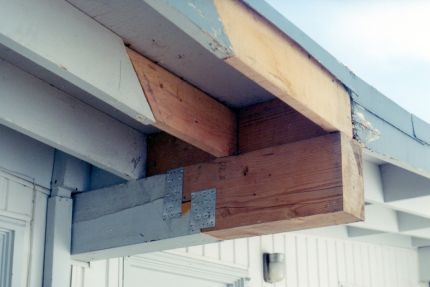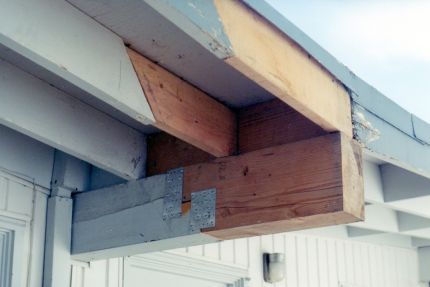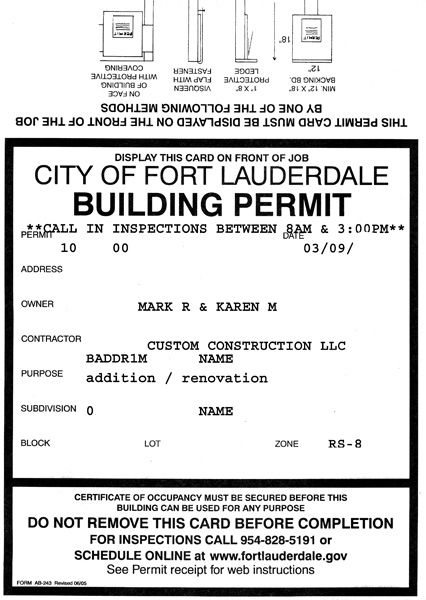Now This Has Gone Too Far!!!

A Permit to Set Tile?
About 6 months ago, my favorite tile setter calls and says “Hey, can you pull a permit for me to set some tile?” Knowing that he was working in the local area, I was stunned and thought, he’s kidding, right?
We talked about it a little more and I found out he was setting tile in a condominium. He had the right licenses and insurance, but the condo required him to get a building permit before he could start the work.
I looked over the requirements from the Condominium and the City and thought, “this has gone too far.” So I called the helpful building department, told them who I was and gave them my short song and dance and said, “Is this right?” “Yes, Sir.” she answers in her best rural southern dialect. I said, “Who exactly, is qualified to pull this permit, if the tile setter himself can’t’ get it?” She says, “A state licensed Building or General Contractor.” Not even a Residential Contractor could get this permit. I said, “Who reviews this permit application? What are they looking for and who inspects the work?” She says, “The structural plans reviewer and the structural inspector are verifying the installation of sound deadening material.” I said, “We’re talking about ceramic floor tile inside a condominium unit, right?” she says, “Yes Sir.” By this time, even I could tell she was getting a little annoyed with me for wasting her valuable time.
And then, the stupidest words ever, rolled uncontrollably off my tongue. “Lady,” I said, “I’ve been building here in South Florida for almost thirty years and have set tile in more than my fair share of condos and I have never heard of anything as stupid, remotely similar to this.” Wrong thing to say! And she says, “Well, Mr. Kon-Trac-TOR, I can personally guarantee that you haven’t been doing it in our City!!!” — Touché. She was right. We got the building permit and inspection for the tile installation and moved on to other projects.
Purpose of Permits
What is this purpose of getting a permit to set tile in a condominium? What is the purpose of any permit for that matter? Who is being protected from whom? Or, is this just another revenue collection mechanism?
Yes — it is another revenue collection mechanism. Additionally, permitting and inspections protect the public from unprofessional contractors and the public from themselves.
In the tile setting story above, inspecting the installation of the sound deadening material is the only reason for the permit. The unit owner paid for the sound deadening material, the other unit owners have a right to expect that it is actually installed and the next owner wants assurance that all the work done to the unit was done properly. My guys always install the sound deadening material. That’s partly what I get paid to check. No other local municipality inspects the sound barrier, but, I bet they’re about to start.
Building Codes and Building Departments
Building Codes establish a minimum standard of performance for all types of buildings and building systems. The established standards make sure there are enough outlets, tile underlayment and properly designed beams and exits in a building. Permits and inspections ensure that the actual installation matches the established standard.
This a quote from the home page of a Connecticut Building Department that summarizes the intent of permits and inspections very concisely:
The purpose of permits and inspections is to ensure public safety, health and welfare insofar as they are affected by building construction, through structural strength, adequate exit facilities, fire safety, light and ventilation and sanitary equipment. In general, the Building Department functions to secure safety to life and property from hazards incident to the design, erection, repair, removal, demolition or occupancy of buildings, structures or premises.That’s a great definition of building permits and the function of the building department. How does a permit to PAINT fit into that description?
Crazy Permits
In South Florida, you need a permit for everything, from lawn sprinklers to paint. Well, you don’t really need a permit to paint in all communities in South Florida. Coral Gables and Boca Raton, two nearby cities, require architectural review of paint color schemes and a permit. The review/ permit process protects the historical fabric of their cities.
I just did a façade renovation in another nearby city. I designed, permitted and selected the fabric for a new awning as part of the project. I got a call from the City Architect asking me about the color of the building. She really liked the color. It is very different from the surrounding buildings and so is the awning. She rode by the building to see our new color and told me afterwards that “normally, we would have been required to get a permit to repaint the building”. She liked the color we chose and the match to the awning so everything was ok but even this City requires a permit for paint in their downtown area.
How about hanging a ceiling fan?
In South Florida, a permit is absolutely required to hang a ceiling fan. Consider the protections afforded by a permitted, properly installed, ceiling fan; not to say the installation would be done improperly if not permitted. A licensed professional is required to hang a deadly propeller, securely, at a minimum height above the floor (so no one’s head gets cut off) connected to a line voltage electrical source and switch. Lots of places to go wrong with this one. Simple item to permit. More costly to hire the electrician? Yes. Everybody has to assign their own value to the trade off. Looks pretty clear to me.
What about low voltage wiring for stereos, data, phones?
What is the value of permits and inspections for this scope of work? In a residence, no one is going to get hurt if it’s wired wrong. No community is being protected by permitting this work. The work can hardly be done wrong. Is the worst case scenario that no raceway is installed for the conductors?
Permitting items like lawn sprinklers, painting and stereo wiring seem to me like the building department acting as a consumer protection agency. Is this really their job? Can they even do this effectively? There are many more important things the building department should be inspecting. Regardless, all three require permits and inspections here in South Florida.
Professionalism and Workman-like Manner
Remember these terms? When do professionalism and good workmanship come into play in the permit / inspection cycle? We all know the building department is not inspecting workmanship. I’m sure that big metropolitan areas have far more complicated / petty building requirements than we do here in South Florida. I bet the red tape comes in a wider variety of colors too.
Maybe it’s OK?
Lots of communities, especially rural communities, only require permits and inspections for specific items, like septic tank drain field or sewer tie ins. With only a general building permit and no inspections, the qualifiers of the trade contracting companies are responsible for their own work. That probably works well. Rural communities tend to have very stable populations with long term residents. The electrician, general contractor, plumber and owner probably all went to school together. Their professional licenses and mutual respect for each other is the check on the work. South Florida is a little more transient than a rural community and probably benefits from permitting ceiling fan installations.
Mutual Respect
I have a friend who is just finishing a 5,500 sf home in the middle of the state in a small community with a one man building department. This one guy is the Chief Building Official, Plans Examiner, Permit Processor, Electrical, Mechanical, Structural and Zoning Inspector. The construction has gone quickly and flawlessly and my friend has developed a rapport with the Building Official. All the permits required here in South Florida are required in this municipality. The mutual respect of my friend and the Building Official has certainly improved the permitting and inspection process for the project.
What are the most unusual items you’ve been required to permit and inspect? Better still, what have you’ve run across, repaired or seen in the field that should have been inspected?
Building Blunders
Anybody see the winner of the Building Blunders photo competition? The competition had lots of great entries. Many did not require permits even in South Florida. Where is the building department when these consumers needed protection? The truss bracing photographs were some of my favorites. They point out the value of the professional protecting the consumer. Even here in South Florida, there are no temporary truss bracing inspections. I bet no one has thought of it yet. No, it’s probably coming in the next set of revisions to the Code? The winner of the competition was far and away the best. I bet they wish someone knowledgeable, contractor, carpenter or Building Official, had looked at their project before the “contractor” was paid!
Fine Homebuilding Recommended Products
Fine Homebuilding receives a commission for items purchased through links on this site, including Amazon Associates and other affiliate advertising programs.

Homebody: A Guide to Creating Spaces You Never Want to Leave

Musings of an Energy Nerd: Toward an Energy-Efficient Home

Get Your House Right: Architectural Elements to Use & Avoid





























View Comments
Seattle area! Local city. Detached garage burns 90% of the way down to the foundation. Need a permit to demolish the rest of the garage so it can be rebuilt back to the way it was. Additional permit needed to rebuild back to the way it was using the original prints.
In this jurisdiction I think you need a permit to us TP in a folded manner, another to use it crumpled, another for front to back and vice versa!
Your money hard at work.
I live in one of those rural areas where there is minimal code enforcement. Most of the time, everything works fine that way, but horrific situations do occur from time to time.
And that's what code enforcement really is (or should be) all about: preventing those horrific situations. I think most code enforcement is well-meaning in that respect, but it also tends to be administered by people who have lost sight of the initial motivation, and are inclined to simply follow rules rather than actually think.
And then there are those who purposefully use code enforcement as a tool to further a particular political agenda that has nothing to do with safety (e.g., preventing low-cost housing from being built in a high-rent neighborhood).
Code enforcement of aesthetic concerns, like paint colors, is, I believe, completely wrong. I think it's perfectly reasonable to handle such things with restrictive covenants, with one condition: All such covenants MUST be of finite duration, and expire within a reasonable time (say, ten years). When a covenant does expire, it should be up to the parties involved whether or not to institute a new covenant.
-Steve
I live in Honolulu, and I'm a general building contractor. That USED to mean I could build anything from a tool shed to a high rise condominium. The only trades I had to subcontract were electrical and plumbing. And for good reason.
But every few years they take another away. The latest was masonry. Now I can pour a slab, but I can't set CMU block. I need to either get a mason license or else sub it out.
The idea is definitely not quality-based but revenue based. The state licensing bureau now gets to collect license fees from one more person every time they take away one of my trades.
Welcome to the new world order. If you do a search (not "google", as they track everything you do and keep it forever - for what purposes, we can only guess) for "Agenda 21", you will be looking at the global elites' plan for how everyone is to live in the 21st century - including how structures will be built - down to the wiring, plumbing, etc. Who these people are, and why they think they have, not only the "right", but the "authority" to draft such a document and impose it on the world is beyond me. The deal is, nation states can reject it, so the plan shifted to have their "agenda" adopted at state, county, and city levels. CA enacted "Green Building Codes". It was up on the net for a brief time and I downloaded it. When I went back to the site a few days later, it was taken down - I can only guess it's because legally, they have to post it for the public for a period of time, after that, you have to spend $$ to get it. Interestingly, within CA's new "Green Building Code", they have calculated and dictated everything - down to how many flushes you get per day depending on gender. Yup, you heard that right. Women get 3 flushes per day, and men get one flush per day (if there's a bidet installed) (Note: I didn't see any flushes allotted for cleaning the toilet.) Now which elitist pig decided all this is beyond me, but this is what's coming at you - all across America - if you don't get down to your local county board of supervisors' meeting and planning commission meetings and start giving them hell for adopting all these ridiculous, burdensome fees, "permits", unnecessary codes, etc. This country is at its most critical time since the Civil War - that was when the U.S. did a 180 away from the Constitution. I encourage everyone to watch the following video - it will explain much about what's going on with this country financially, "Why We Are So Much In Debt". It is in 8 parts - watch all of them and then pass it on to everyone you know: http://www.youtube.com/watch?v=c5Yf3FCZ5FY&feature=autoplay&list=PLCBB8C3797181C33F&index=1&playnext=8
How is the number of flushes per person per day by gender monitored? Do toilets need a built in counter with an identifier (retinal scan, finger print, butt print, etc) to be up to code? What about children or the elderly? What about diabetics who have to urinate more often? Does one need an exemption if he gets diarrhea?
I guess Al Gore's next Nobel Prize can be for the sequel to his first work of fiction. It can be titled, "An Inconvenient Poop." Will the green building code be supplemented with the yellow plumbing code?
In all seriousness, as I look to move into a new home I am very interested in whether the owner permitted for the new addition, the kitchen remodel, or whatever significant improvements were made. In PA, the seller's disclosure simply asks "yes" or "no" for permitting for improvements--and there is no simple way to verify the "yes."
There are two sides to the coin of regulations: too much or too little. Either can be driven to excess by politics. The people with wisdom rooted in experience are needed to make sure regulations and permitting are common sense, but they are usually the ones who are too busy working to take time out to attend the city or township meetings.
@hutch:
I'm not sure where AAH gets his information (conspiracy theory web sites, maybe?), but he's way off the mark. The California Green Building Standards are freely available; you can download them from http://www.bsc.ca.gov/default.htm.
There is no regulation concerning how many flushes anyone is allowed to have. Period. What AAH is completely misinterpreting is a worksheet that is used to compute the total amount of DESIGN water usage allowed under the standards. (He is also looking at the non-residential values, which has 1 flush per male and 3 per female because males get an additional 2 urinal flushes; for residential construction, it's 3 flushes regardless of gender or sexual orientation.)
Anyway, the purpose of the worksheet is to serve as an alternative to the typical per-device standards that we all know about already (e.g., 2.0gpm max shower heads). Not all construction is the same, and the worksheet allows nonstandard situations to be accommodated.
-Steve
A predictable consequence of the burgeoning permit requirements is the increasing number of projects that are done without permits.
• I just completed a small addition/remodel project in the Seattle area and there were a total of 26 required inspections. 26!!!
• Permit fees in King County area run from 3-5% of the construction cost in addition to almost 10% sales tax on the project.
• Upon application for a project in the County (simple one story addition to a one story house - no 'special' environmental issues, no special requests, etc), we were told the permit would be ready in 6 months. 6 MONTHS!! It only took 4 months to complete the construction!!
• To replace a roof on an existing house, we were informed we had to have the septic tank/drain field inspected - $500 fee - and an 8 weeks before the inspection would take place.
As a result of these factors, EVERY client wants to know if the work can be without a permit and weighs the consequences of proceeding without one. All of these factors contribute to a huge number of jobs that are done without any permits.
I'm a Building Official for a mid sized city in the South. I found this to be a very good article for the most part. Well framed and thoughtful. Not overly critical of the AHJ's but, justifiably questioning. I think it would be wise to seperate the enforcement of building and life safety codes from zoning and painting requirements. They are often under the same department but, are very different in scope and permitting requirements.
Coming from a long construction career I've always been a proponent of slowing the growth of government in general and cutting unnecessary regulation.
Most states have mandated that their jurisdictions adopt and enforce a specific set of codes and standards. The buildng officials are a unique set of government officials that can literally be charged criminally for not not enforceing the mandated codes as adopted. If you want someone to take their job seriously, that's how you do it.
I don't know of any Building Official or inspector who wants to be enforcing the Federally and State mandated energy codes, green standards or inspecting tile. Sometimes it is lumped on thier plate along with the important stuff and under the same mandate to enforce.
In all cases, the codes are there because a "govorning body" requires a certain threshold for permitting and inspections. These thresholds are almost never the decision of the Building Official. These guys are usually just as frustrated with the red tape as you are.
Better self policing in the industry could help slow the need for further regulation.
Last thing, the biggest enemy of a fire wall is the low voltage, communications wiring installer. They usually use a hammer and make a hole the size of fist to install a few wires over and over again in a typical install.(inspection needed?)